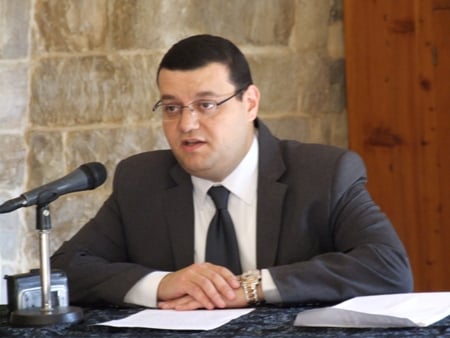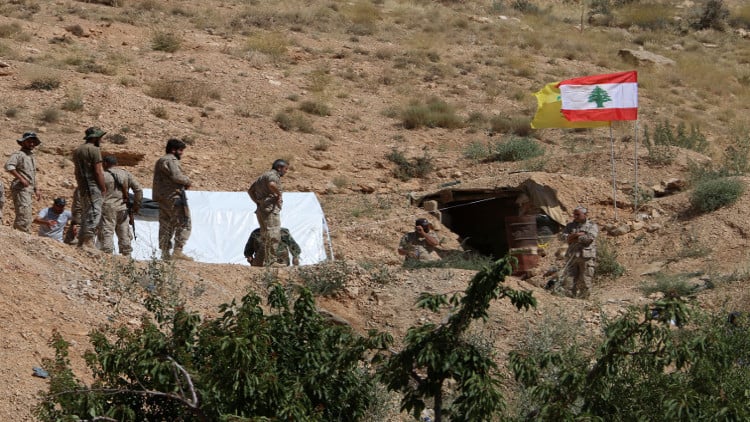The Lebanese armed forces have defeated ISIS: Now what?
Rami Rayess / The Arab Weekly
18 سبتمبر 2017

The Lebanese army’s military operation against the Islamic State (ISIS) in the country’s north-eastern territories has proven an overwhelming success. In one swift move, about 600 of the jihadist group’s fighters and their families were expelled from Lebanon and 120 kilometres of border returned to the country’s control.
The Lebanese armed forces (LAF) was thought to be no match for ISIS, feared for its barbarism and its fighting prowess. From a military point of view, little was expected from a fighting group discounted as weak and incapable of defending its own borders from the various incursions that have plagued Lebanon over the years.
During the Lebanese civil war (1975-90), the LAF was divided along political and religious lines. Under this confessional system of operation, accusations of bias in favour of one group over another were commonplace and contributed to the LAF’s weakness. After the war ended, the Lebanese army contingents were reshuffled to overcome the ingrained shortcomings foisted upon it by the confessional and sectarian system.
However, despite the reforms, little has fundamentally changed. Although the army has helped preserve internal stability in the country, especially in high times of tensions, it has never been regarded as sufficiently able to liberate land from various alien occupiers. The long Israeli occupation of the south was only ended after military resistance, later coopted by Hezbollah, grew powerful enough to at least offer some counter to Israeli military might. It should be remembered that the full Israeli withdrawal of Lebanon didn’t take place until 2000.

Another foreign power that enjoyed 30 years of hegemony over Lebanese affairs was the Syrian Army. Syrian troops were only ousted when angry Lebanese took to the streets after the assassination of former Prime Minister Rafik Hariri in February 2005, along with unprecedented pressure from the US and the world to withdraw. Up until then, starting with its occupation in 1976, Syria all but controlled Lebanese politics.
You might have thought that years of invasion and occupation would be enough to convince the Lebanese of the overriding urgency of a national defence strategy. However, despite the experience, the Lebanese community has failed to coalesce around a single vision of what that defence strategy might be.
Exacerbating the situation still further is the continued presence of Hezbollah, Iran’s staunchest ally and military proxy. It has been markedly reluctant to engage in any discussion on what kind of national strategy might best serve the Lebanese people.
On reflection, it’s hardly surprising. Hezbollah’s reluctance to participate in any debate would likely speed the restricting of its military powers and consequentially lessen its influence within the country’s political sphere. Irrespective of what might be in the best interests of Lebanon, Hezbollah has steadfastly operated on its own agenda and, as often as not, that of Tehran’s.
So far, tens of national dialogue sessions have been staged in Beirut, each designed to formulate some kind of national strategy. Despite the involvement of former President Michel Suleiman and Speaker of the Parliament Nabih Berri, nothing has been achieved.
Compounding the problem further have been external pressures. From the beginning of the Syrian revolution in 2011, Hezbollah has gradually been drawn into the conflict in support of the Syrian regime and in opposition to many of the other factions. None of this has been undertaken with the explicit consent of the Lebanese people. However, no one seems to be able to do much about that.
Added to the self-appointed role that Hezbollah has elected to perform outside of Lebanon is the dominant role it has inexorably assumed within the Lebanese political sphere. From participating equally within Lebanon’s complex power-sharing structure, it has come to assume, by denying the country the kind of national consensus initiatives need to progress, the role of final arbiter of any legislative reform. This has applied as much to defence as it has to anything else.
Surprisingly, despite these structural weaknesses, Lebanon has a proven track record of confronting terrorism. However, its right to retain the monopoly on power, like any state within the world, remains a long way from being achieved.
In the absence of any kind of regional settlement, which right now seems fanciful in the extreme, Hezbollah will retain its weapons and Lebanon, the country it professes to defend, will be denied the kind of national defence strategy that might help safeguard its future and that of its people.
 عن أمل جنبلاط المتجدد: لبنان يستحق النضال
عن أمل جنبلاط المتجدد: لبنان يستحق النضال
 صحافيون أم عرّافون!
صحافيون أم عرّافون!
 ماذا يجري داخل أروقة بيت الكتائب المركزي؟
ماذا يجري داخل أروقة بيت الكتائب المركزي؟


 عن الخرائط التي تُرسم والإتفاقات التي تتساقط!
عن الخرائط التي تُرسم والإتفاقات التي تتساقط!
 “الإنحراف في الحياة”/ بقلم كمال جنبلاط
“الإنحراف في الحياة”/ بقلم كمال جنبلاط
 هاشتاغ #صار_الوقت يحل أولاً في حلقة جنبلاط
هاشتاغ #صار_الوقت يحل أولاً في حلقة جنبلاط
 طاولة نقاش عن أزمة الصحافة في جامعة AUST
طاولة نقاش عن أزمة الصحافة في جامعة AUST
 عبدالله: ليظهر لنا وزير مكافحة الفساد حرصه في صفقات البواخر والفيول
عبدالله: ليظهر لنا وزير مكافحة الفساد حرصه في صفقات البواخر والفيول
 عبدالله: غريب أمر وزارة مكافحة الفساد!
عبدالله: غريب أمر وزارة مكافحة الفساد!

 Comment to Uri Avnery: How Sad What Is Looming Ahead
Comment to Uri Avnery: How Sad What Is Looming Ahead
 “Not Enough!”
“Not Enough!”
 … لمن لم يقرأ يوسف البعيني/ بقلم وسام شيّا
… لمن لم يقرأ يوسف البعيني/ بقلم وسام شيّا
 كمال جنبلاط في مولده الأول بعد المائة: تعاليمه وأفكاره ما زالت الحلّ/بقلم عزيز المتني
كمال جنبلاط في مولده الأول بعد المائة: تعاليمه وأفكاره ما زالت الحلّ/بقلم عزيز المتني
 رئيس حزب/ وليس (… سابقاً)/ بقلم د. خليل احمد خليل
رئيس حزب/ وليس (… سابقاً)/ بقلم د. خليل احمد خليل
 التوازن السياسي في لبنان
التوازن السياسي في لبنان
 لبنان… مشاريع انقلابية مؤجلة
لبنان… مشاريع انقلابية مؤجلة
 جنبلاط وحَمَلة أختام الكاوتشوك
جنبلاط وحَمَلة أختام الكاوتشوك
 Le Liban est un symbole de tolérance
Le Liban est un symbole de tolérance
 Our Automated Future
Our Automated Future
 The True Origins of ISIS
The True Origins of ISIS
 Les Misérables vs. Macron
Les Misérables vs. Macron
 عذراً أيها المعلم/ بقلم مهج شعبان
عذراً أيها المعلم/ بقلم مهج شعبان
 رساله الى المعلم / بقلم ابو عاصم
رساله الى المعلم / بقلم ابو عاصم
 إلى روح القائد والمعلم كمال جنبلاط/ بقلم أنور الدبيسي
إلى روح القائد والمعلم كمال جنبلاط/ بقلم أنور الدبيسي
 أسرار وعناوين الصحف ليوم الجمعة 14 كانون الاول 2018
أسرار وعناوين الصحف ليوم الجمعة 14 كانون الاول 2018














